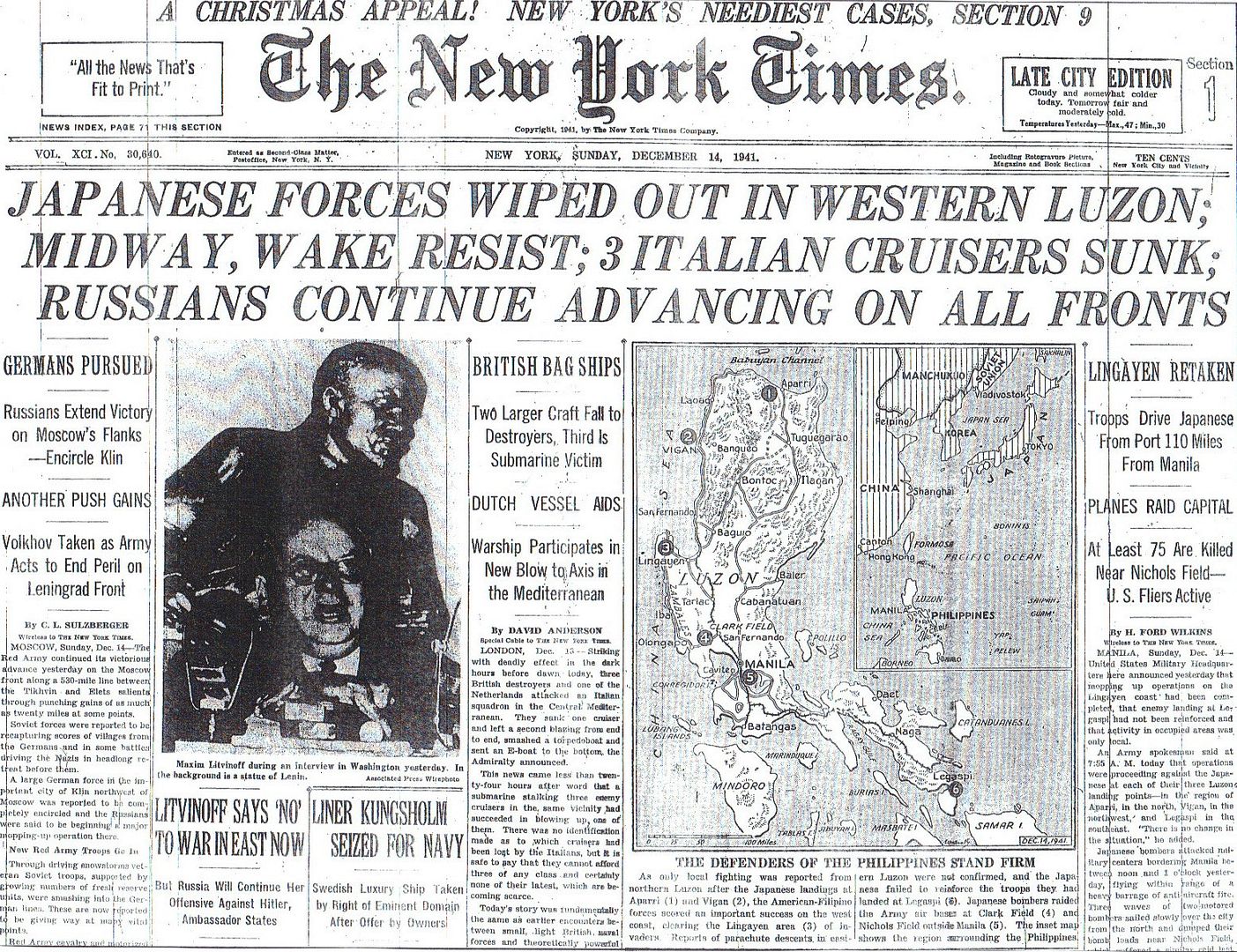
Posted on 12/14/2011 4:44:24 AM PST by Homer_J_Simpson

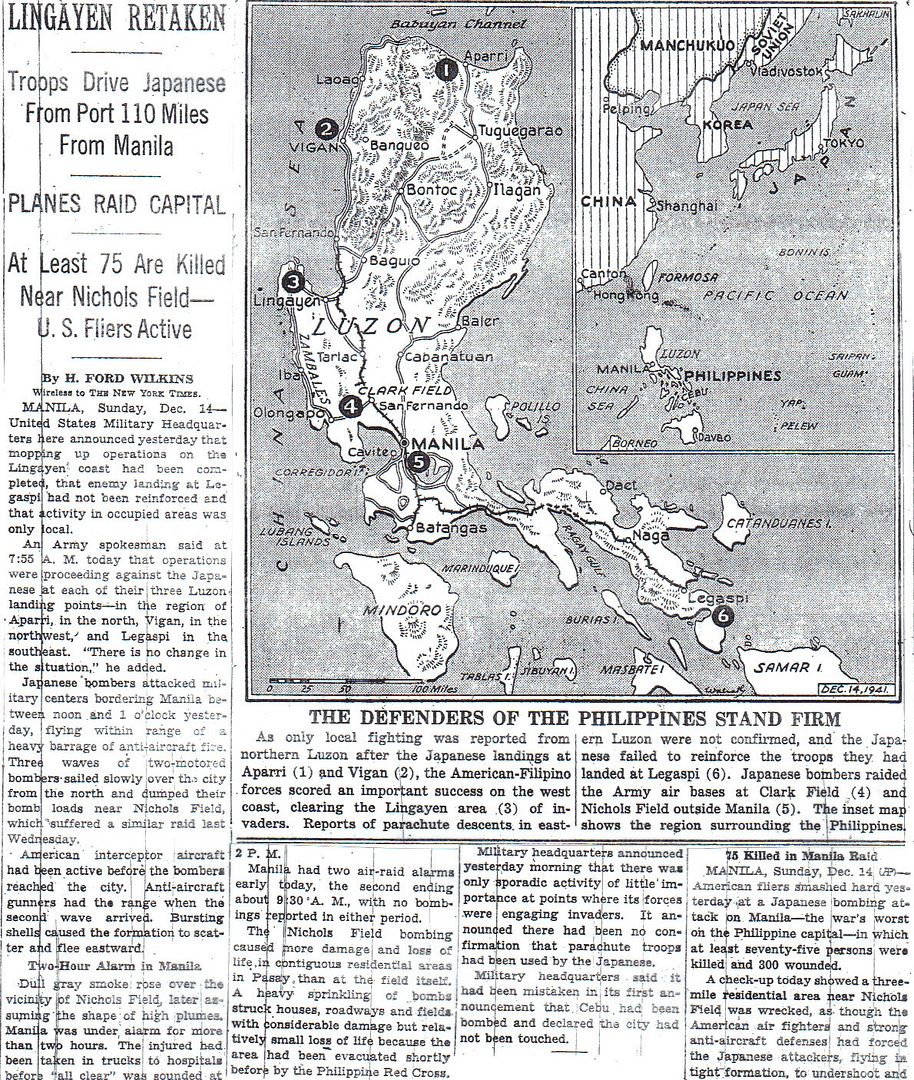
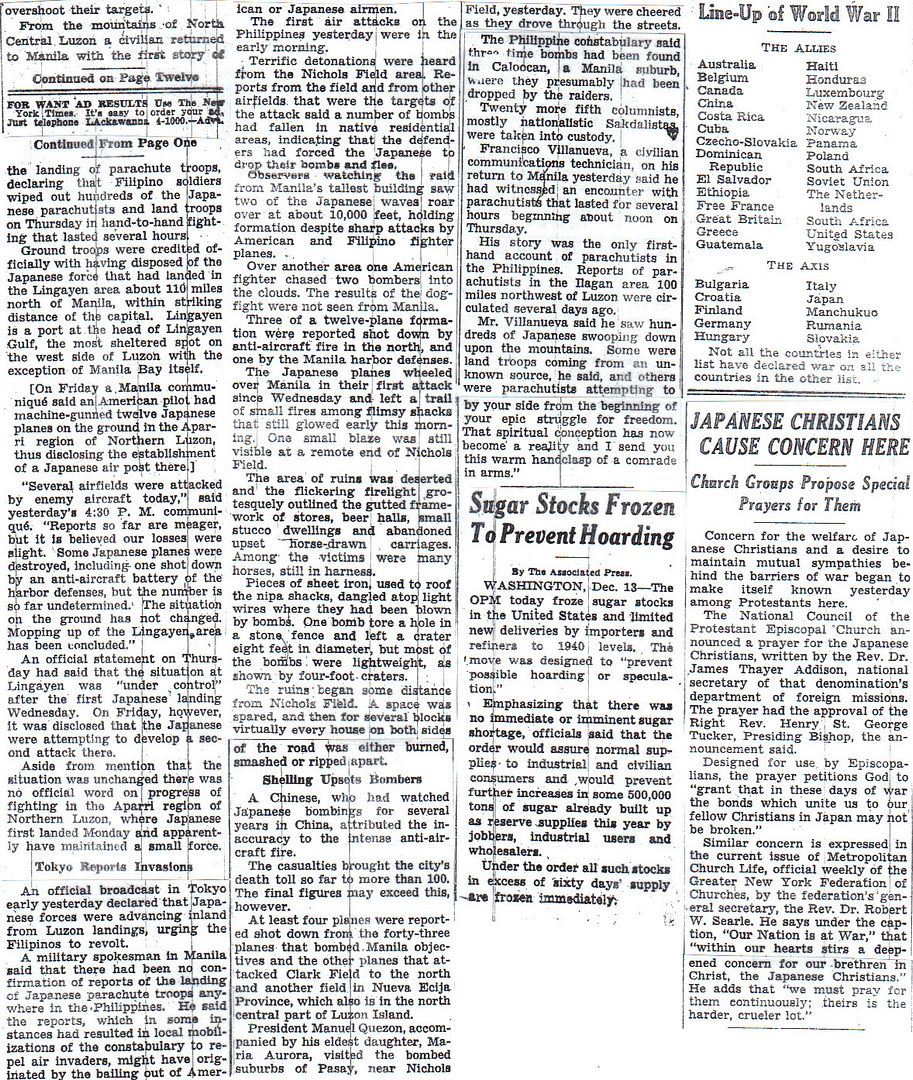
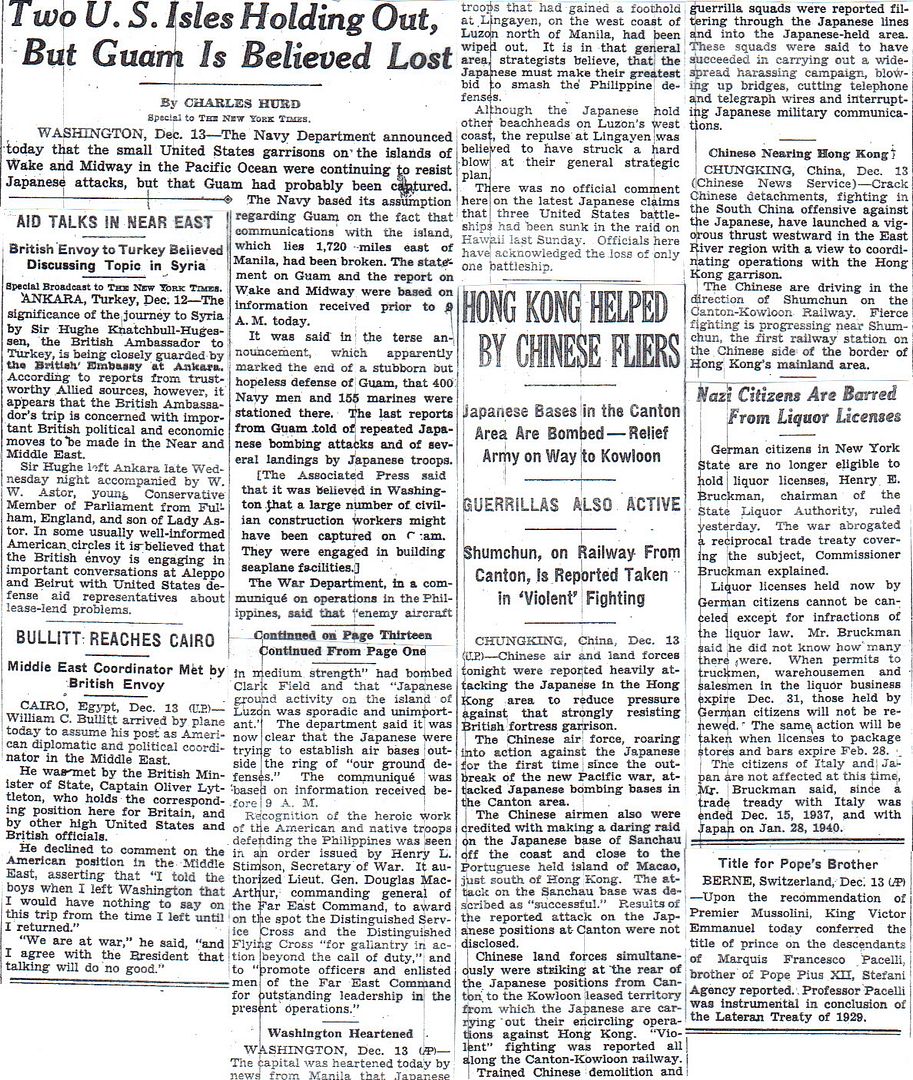
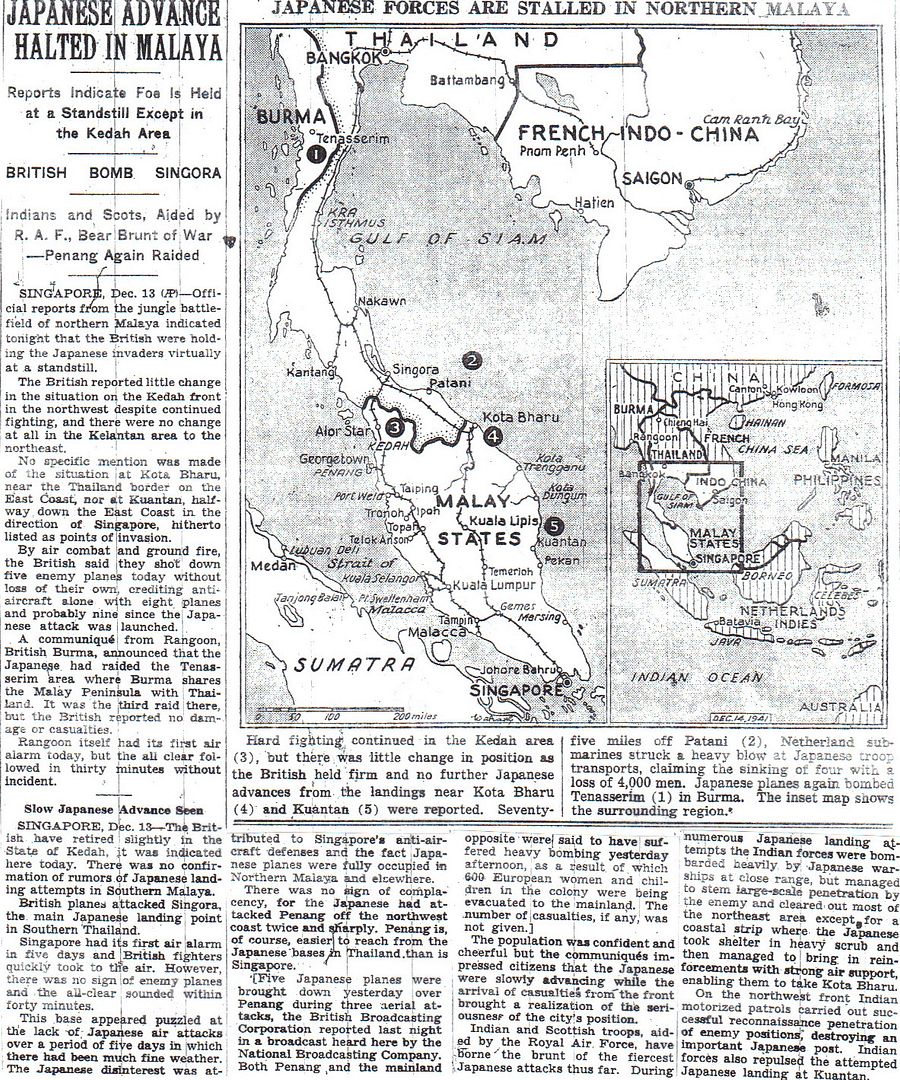
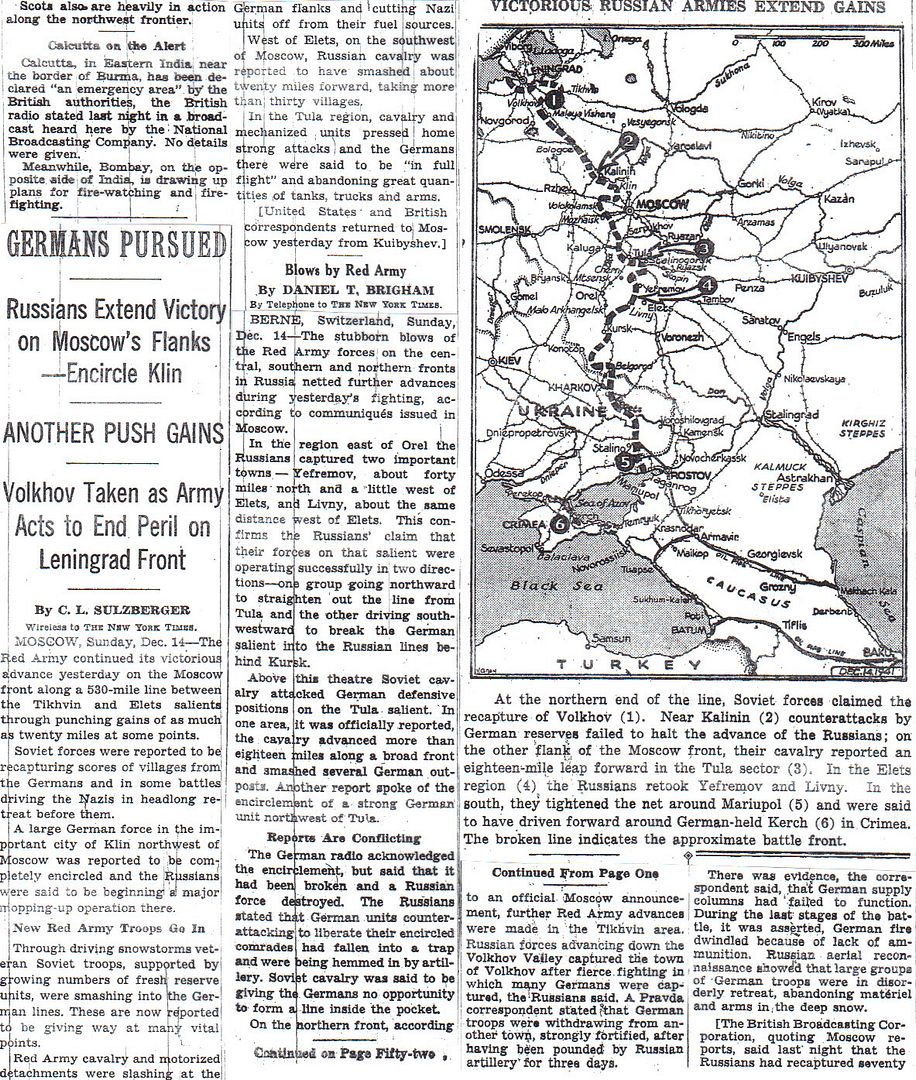
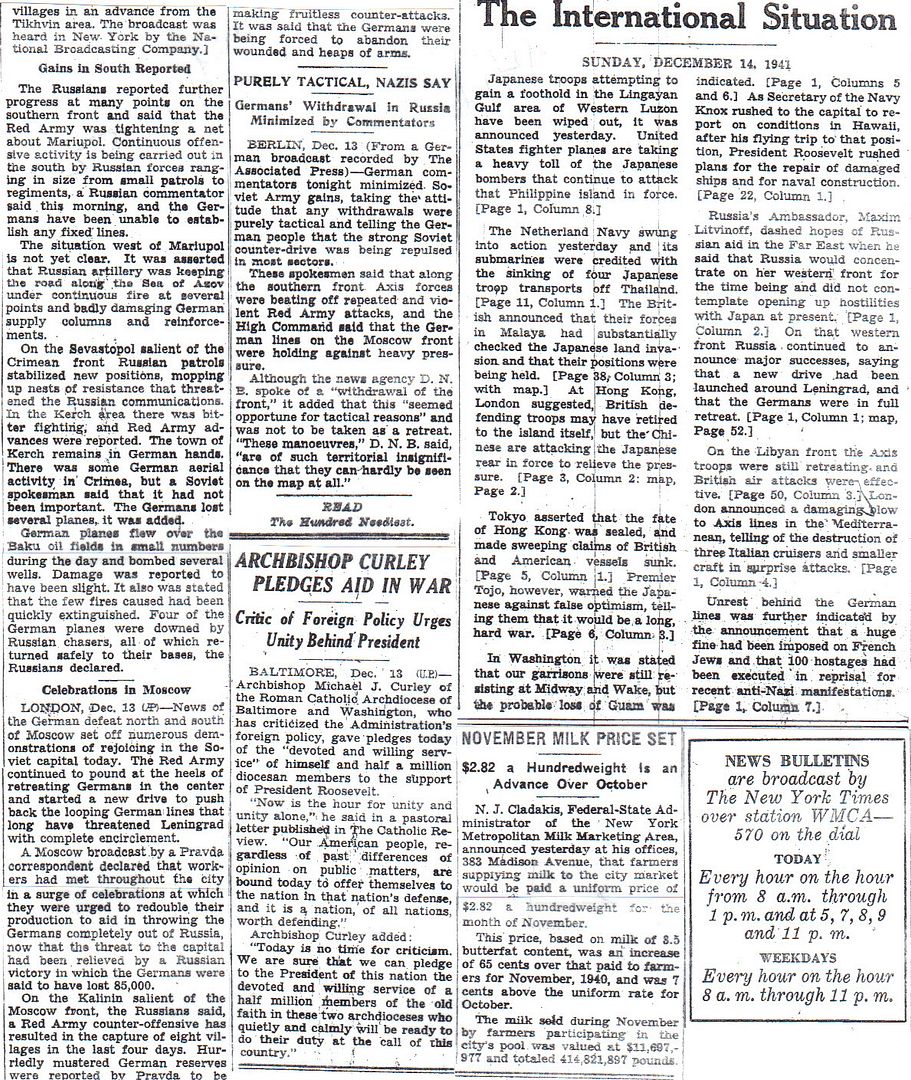
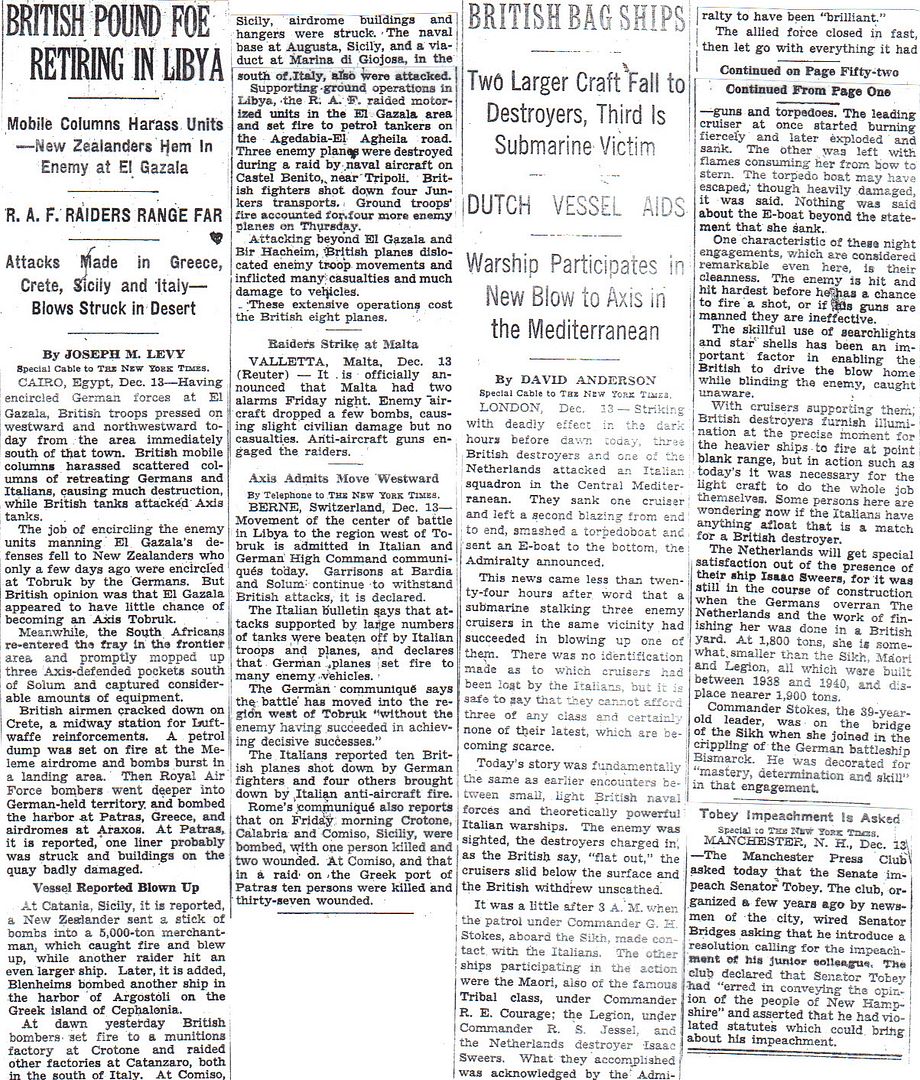
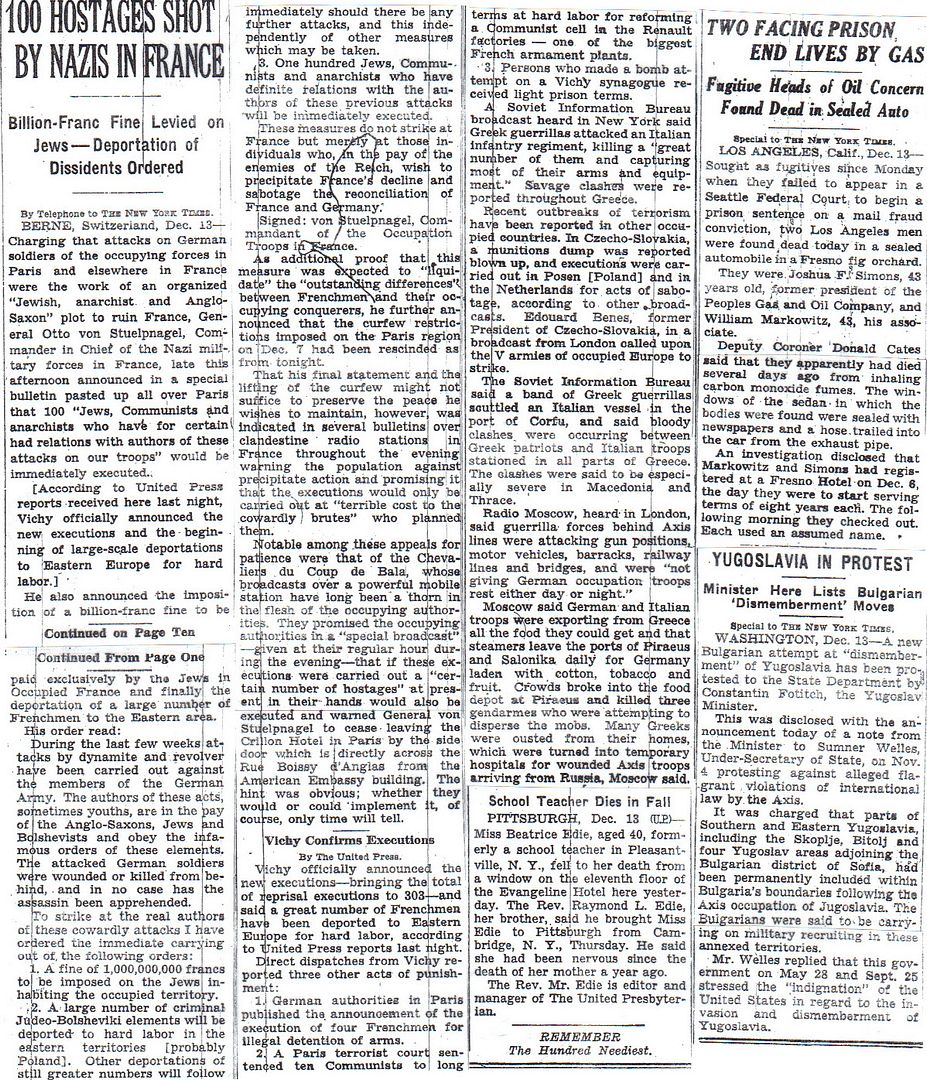
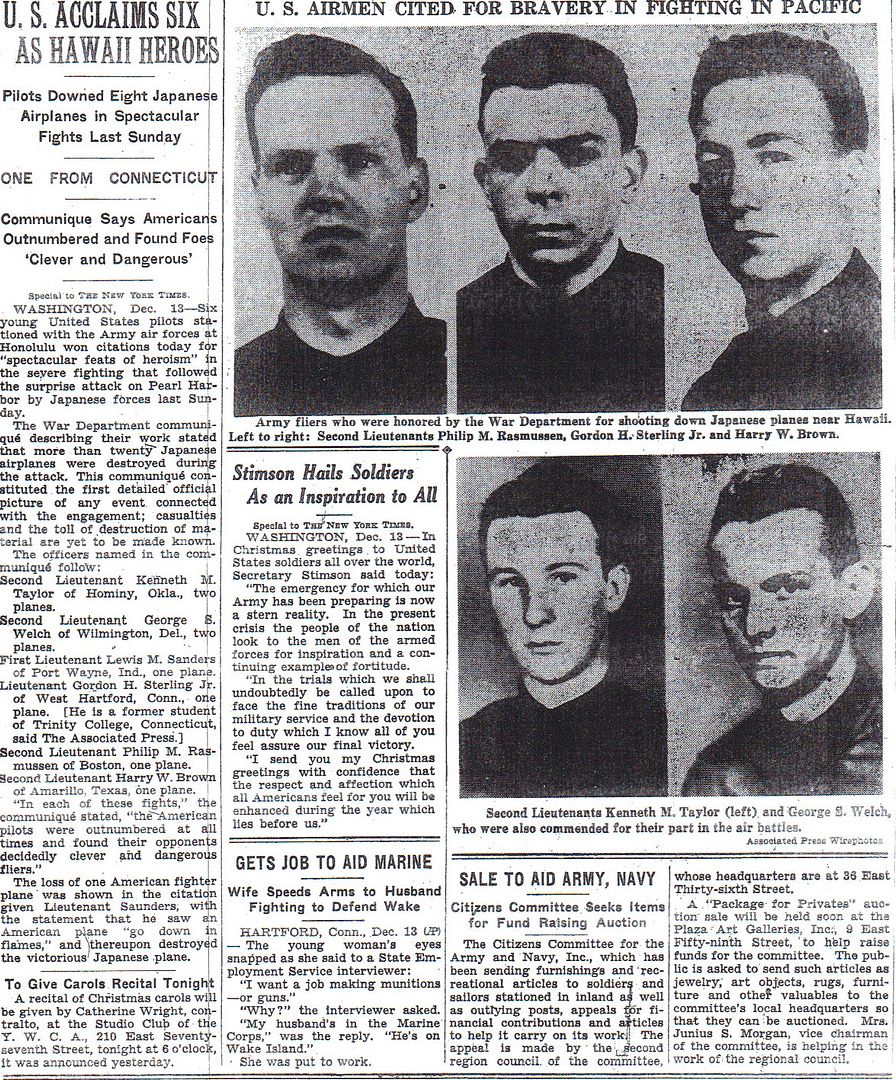
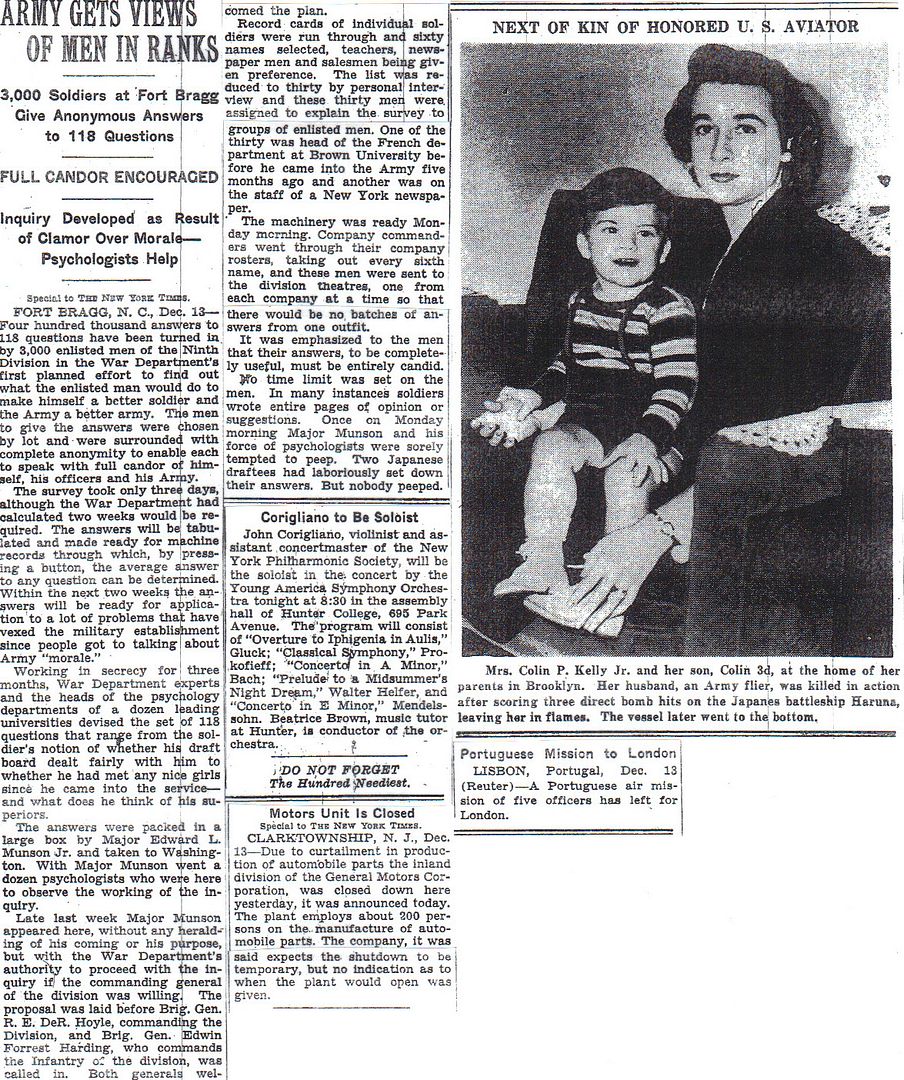
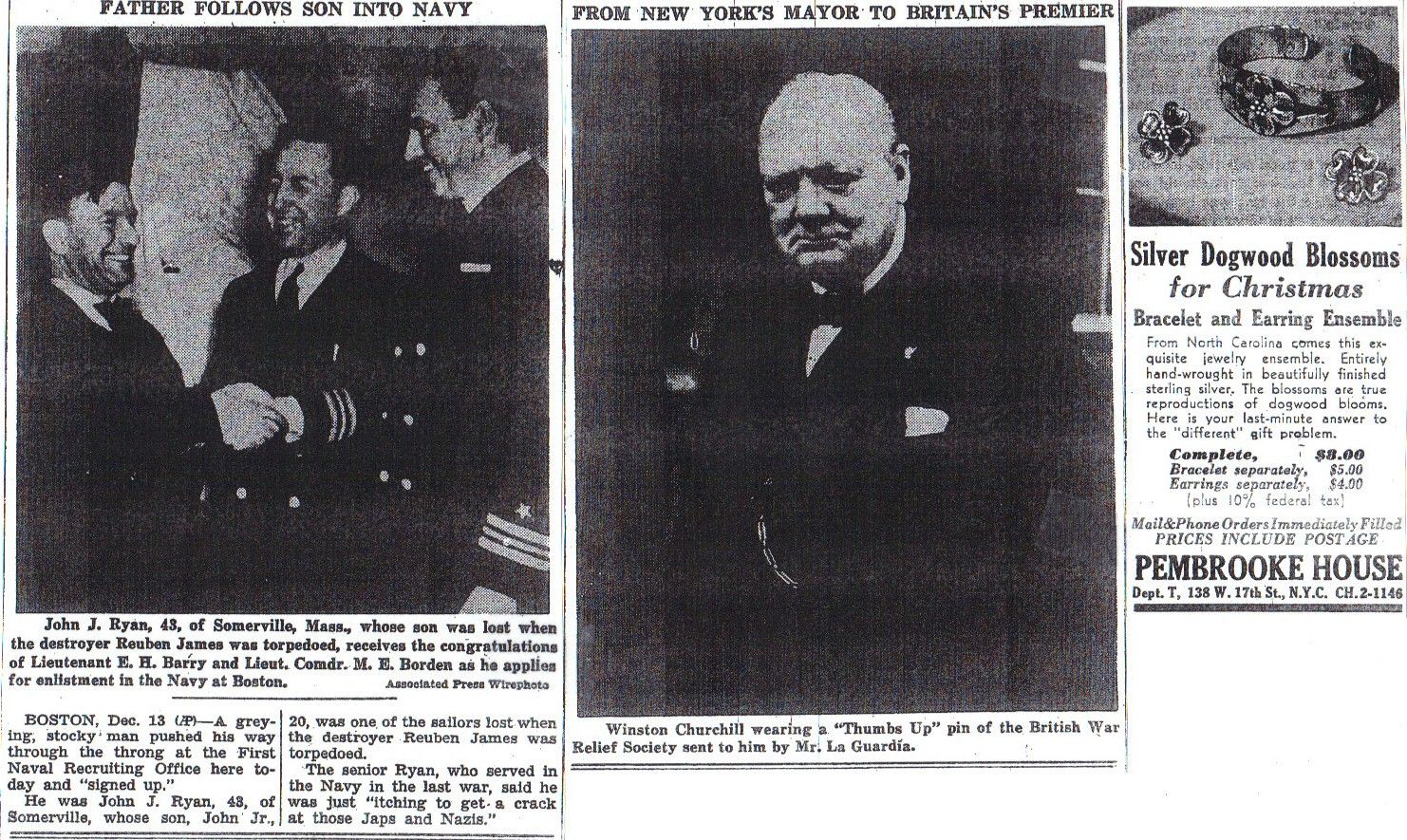
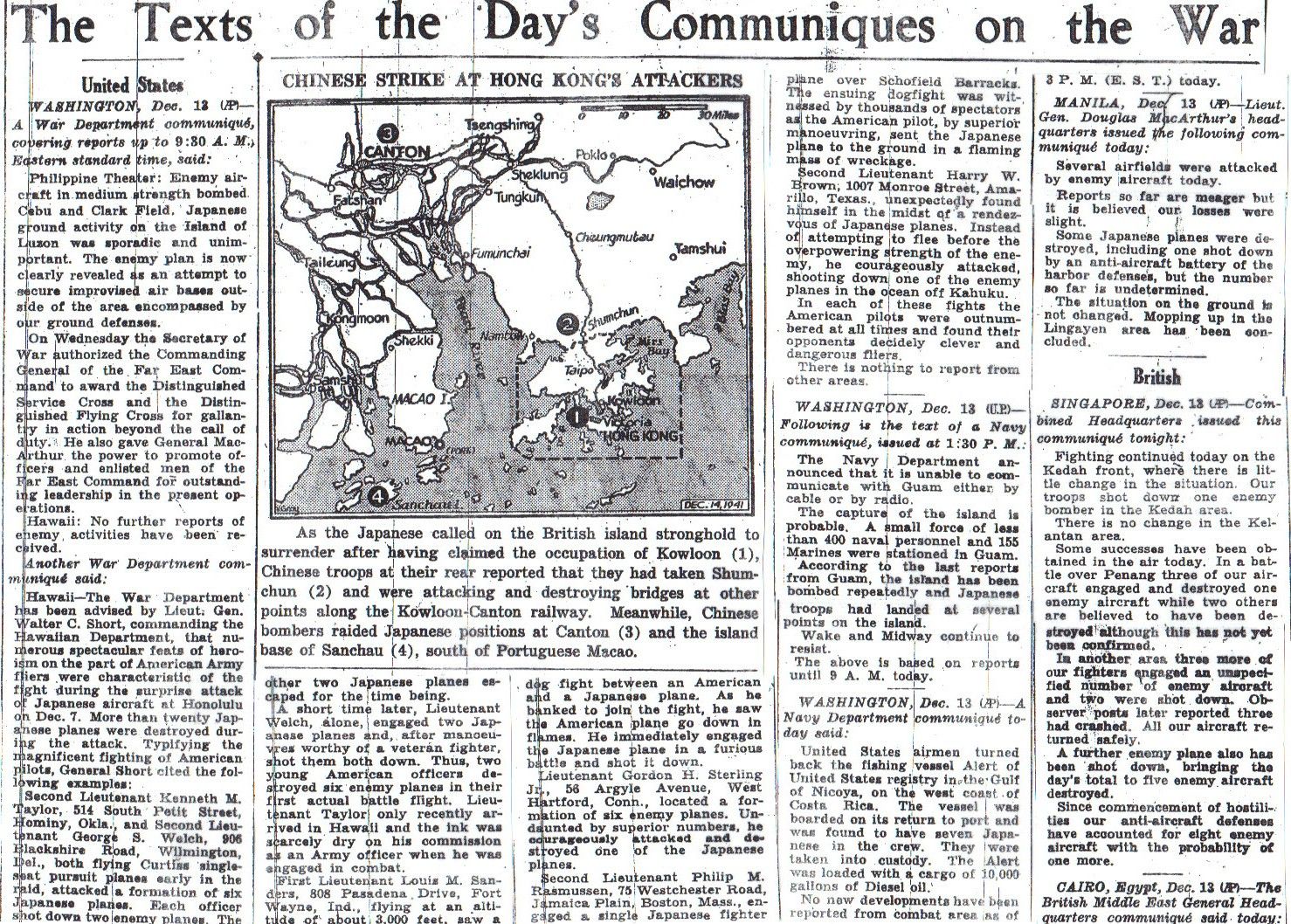
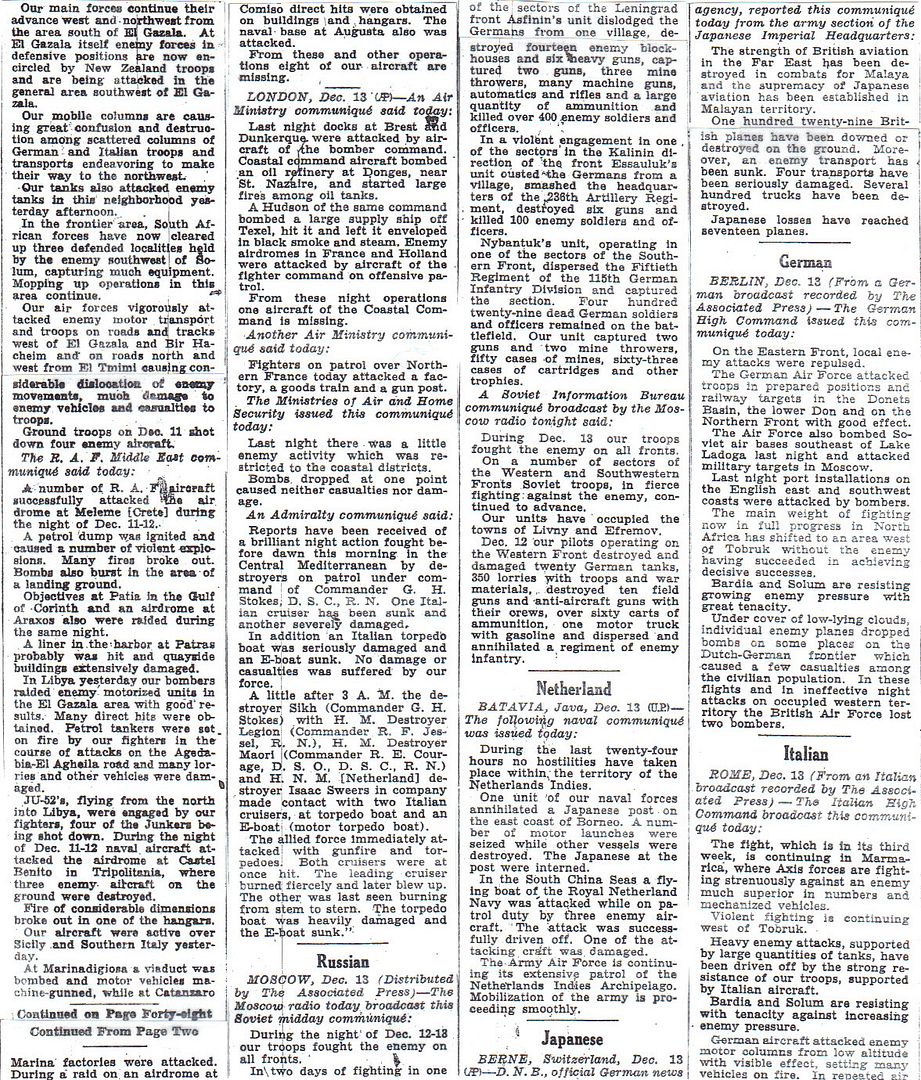
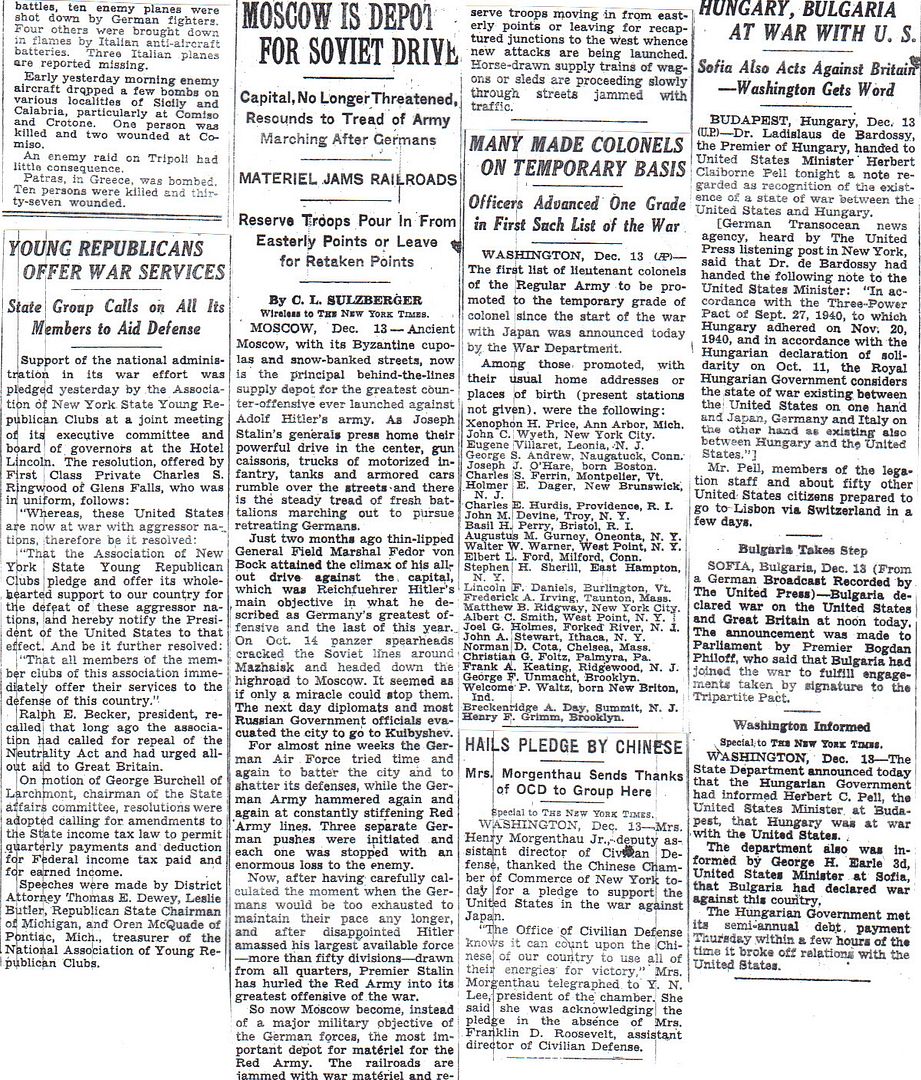
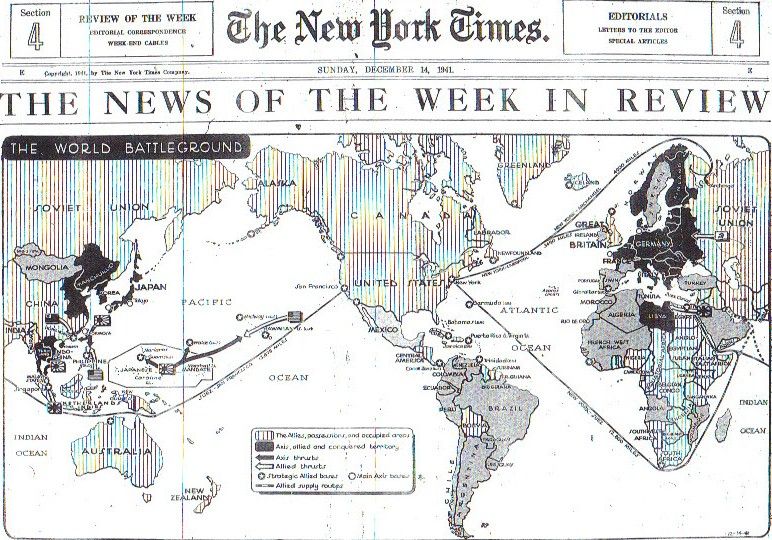
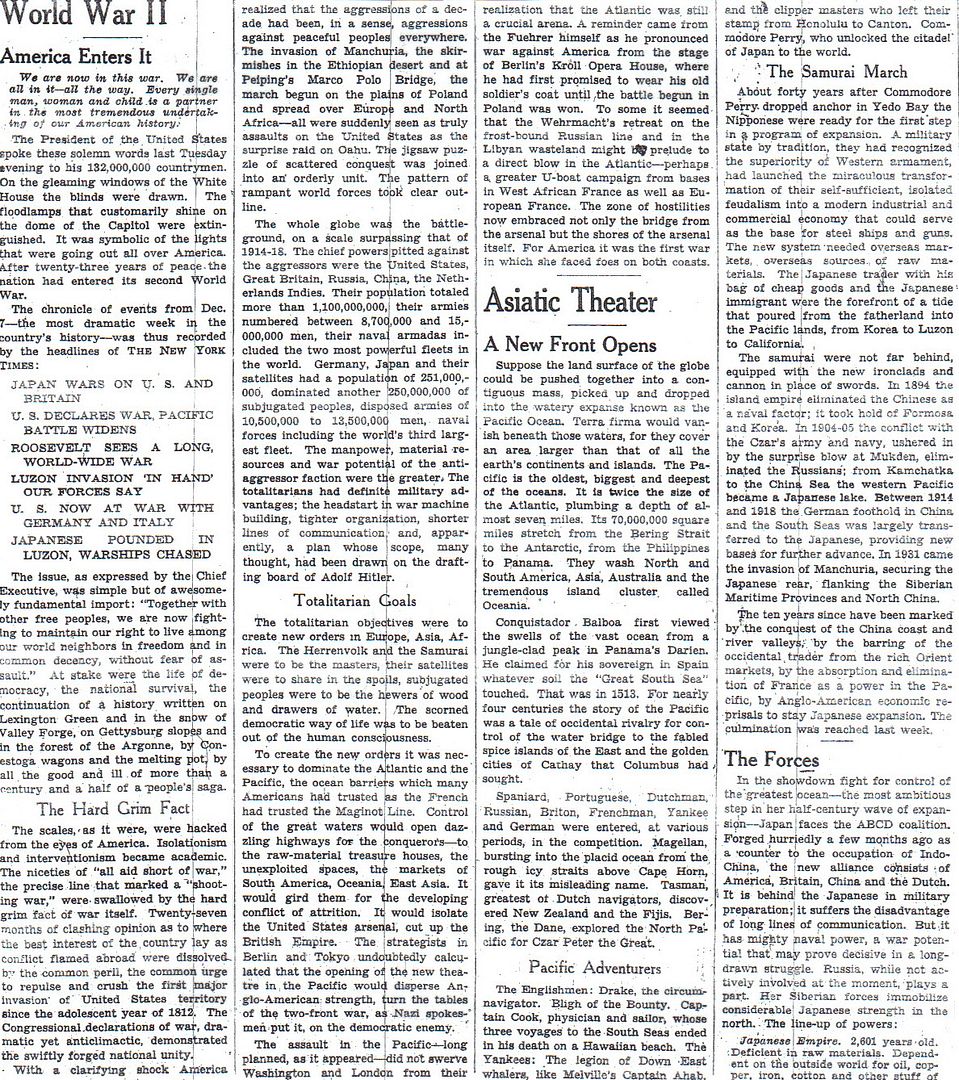
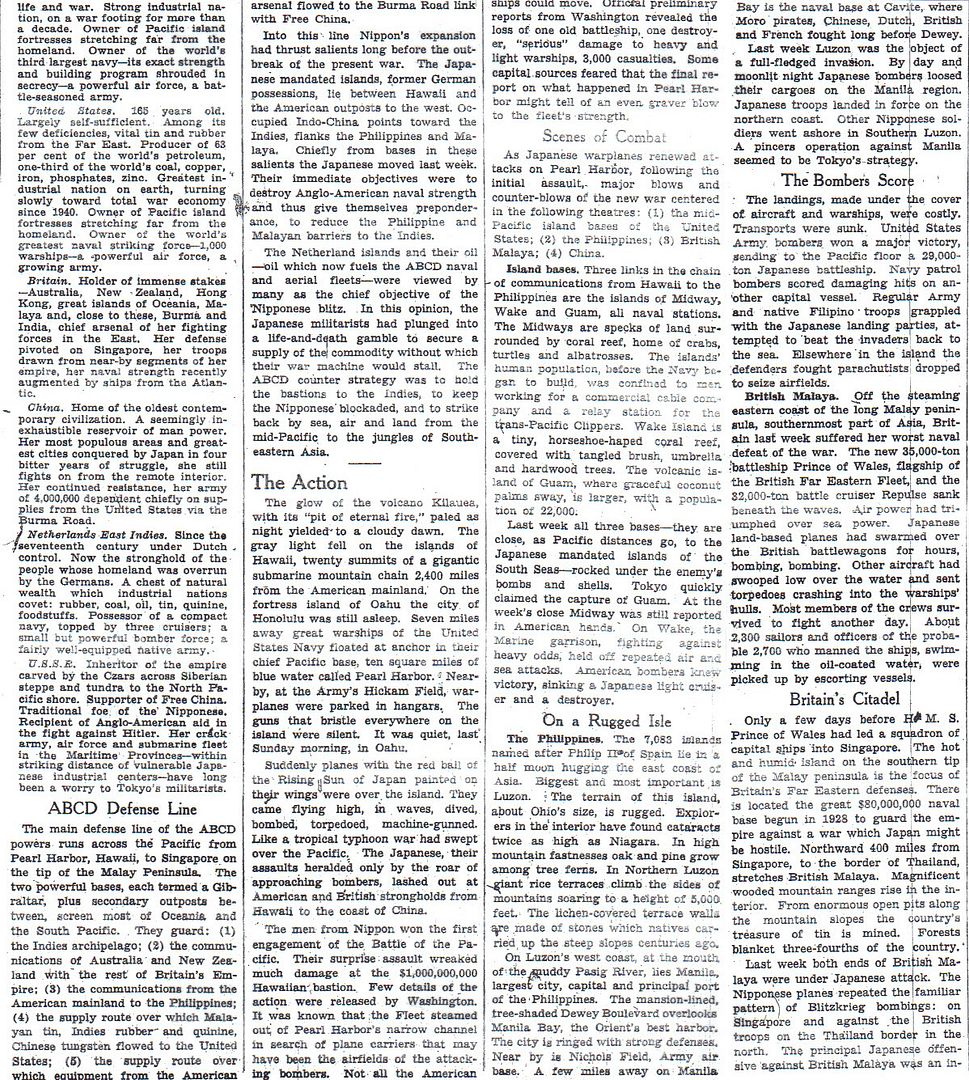
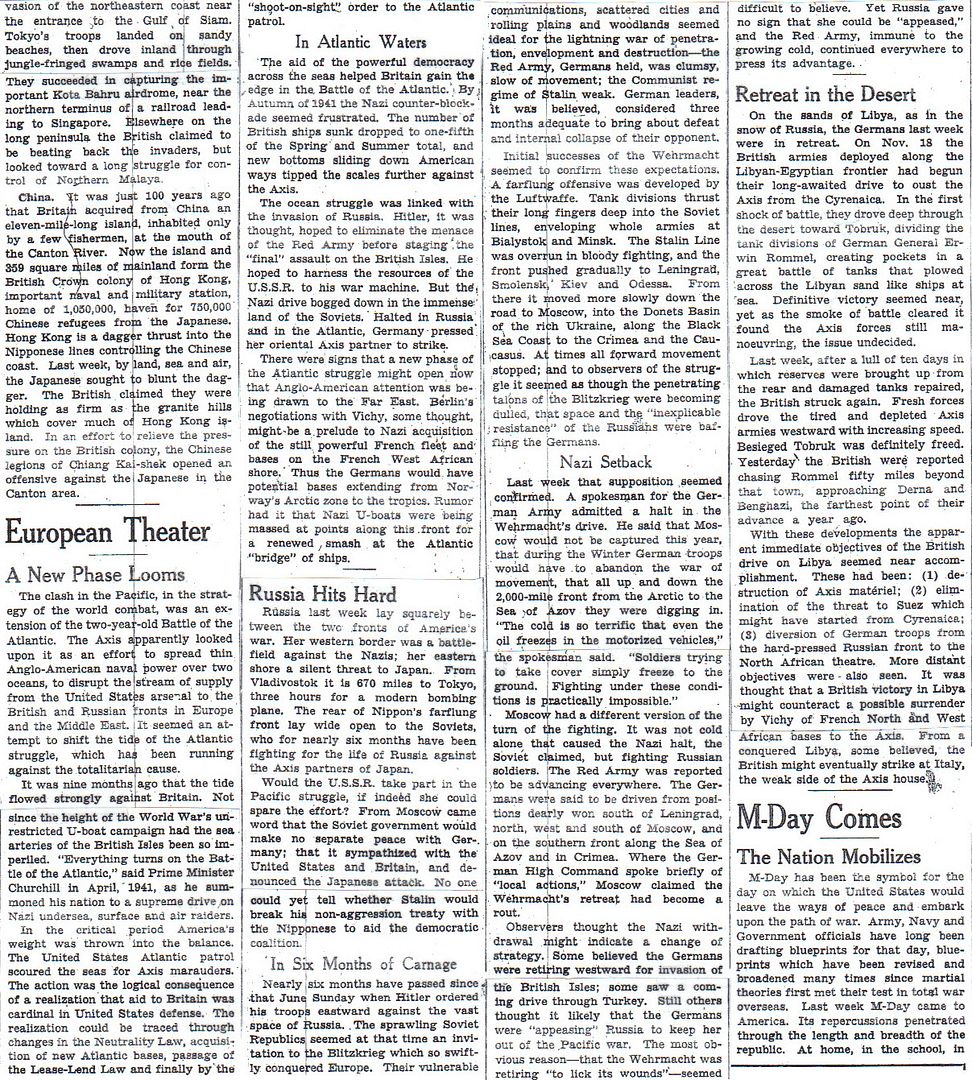
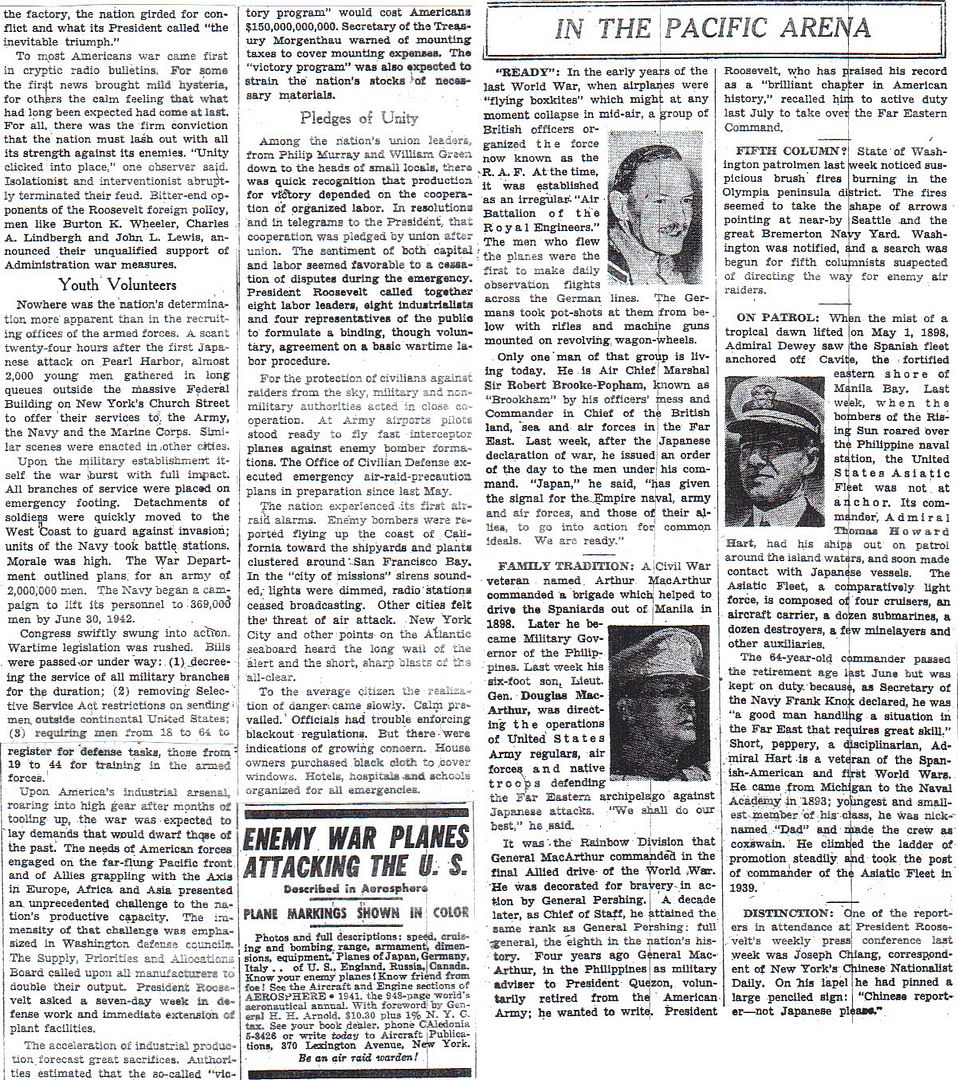
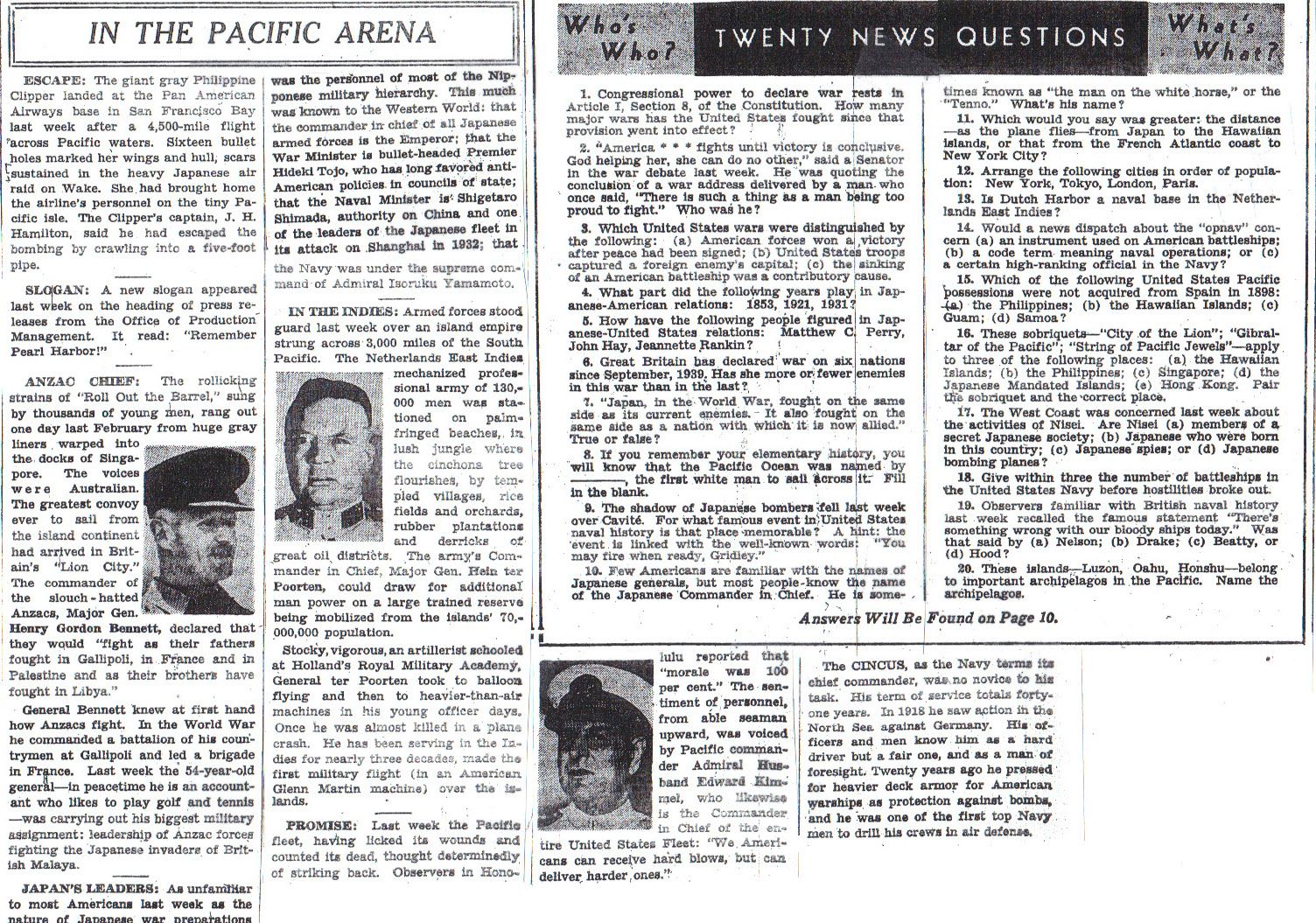
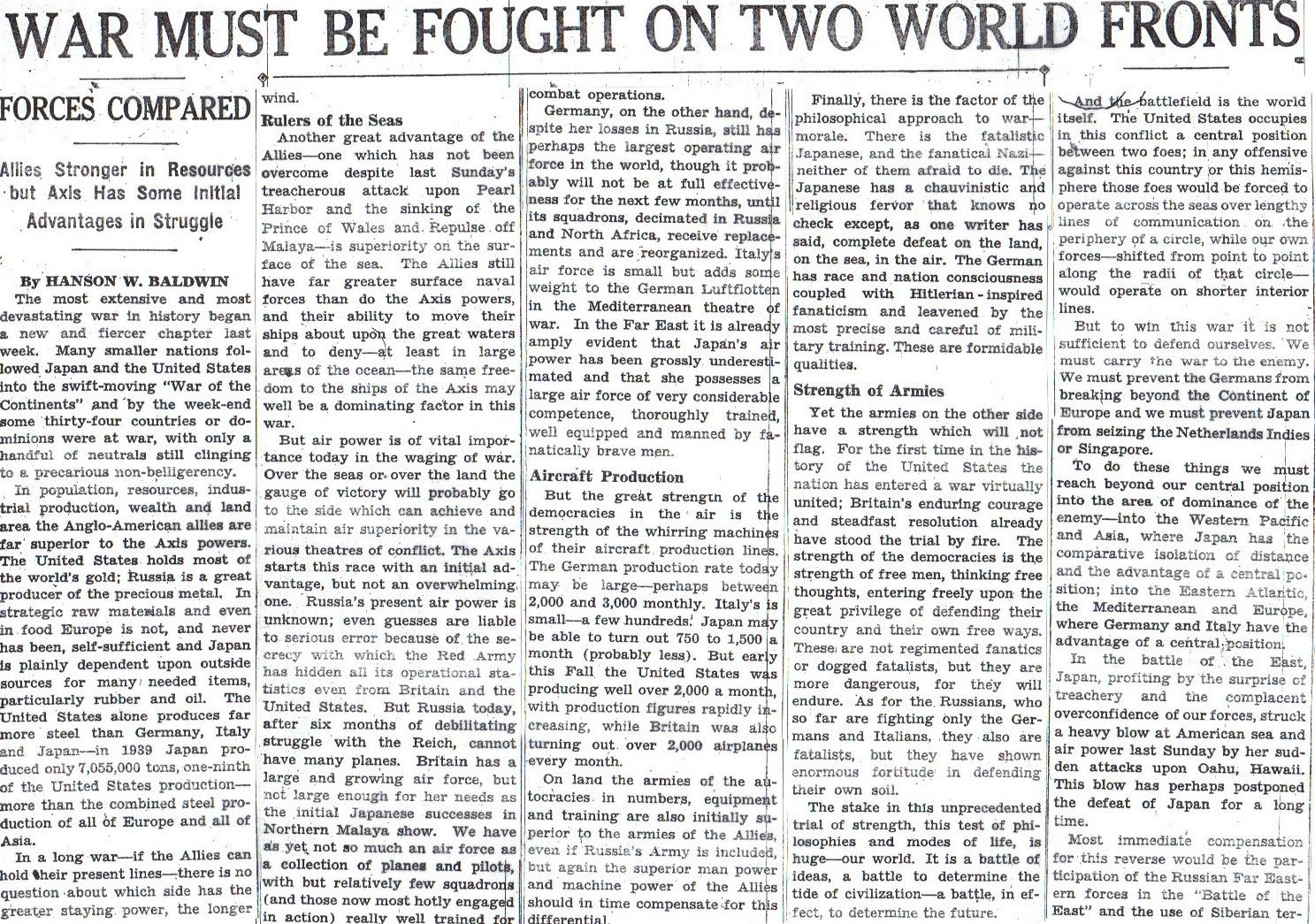
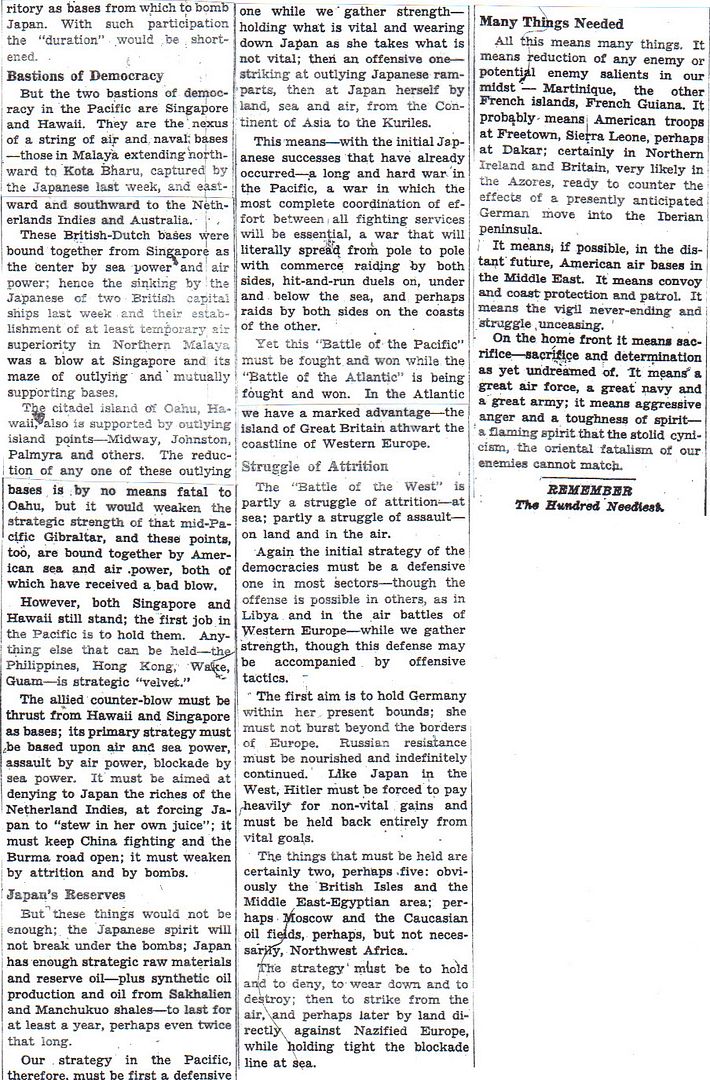
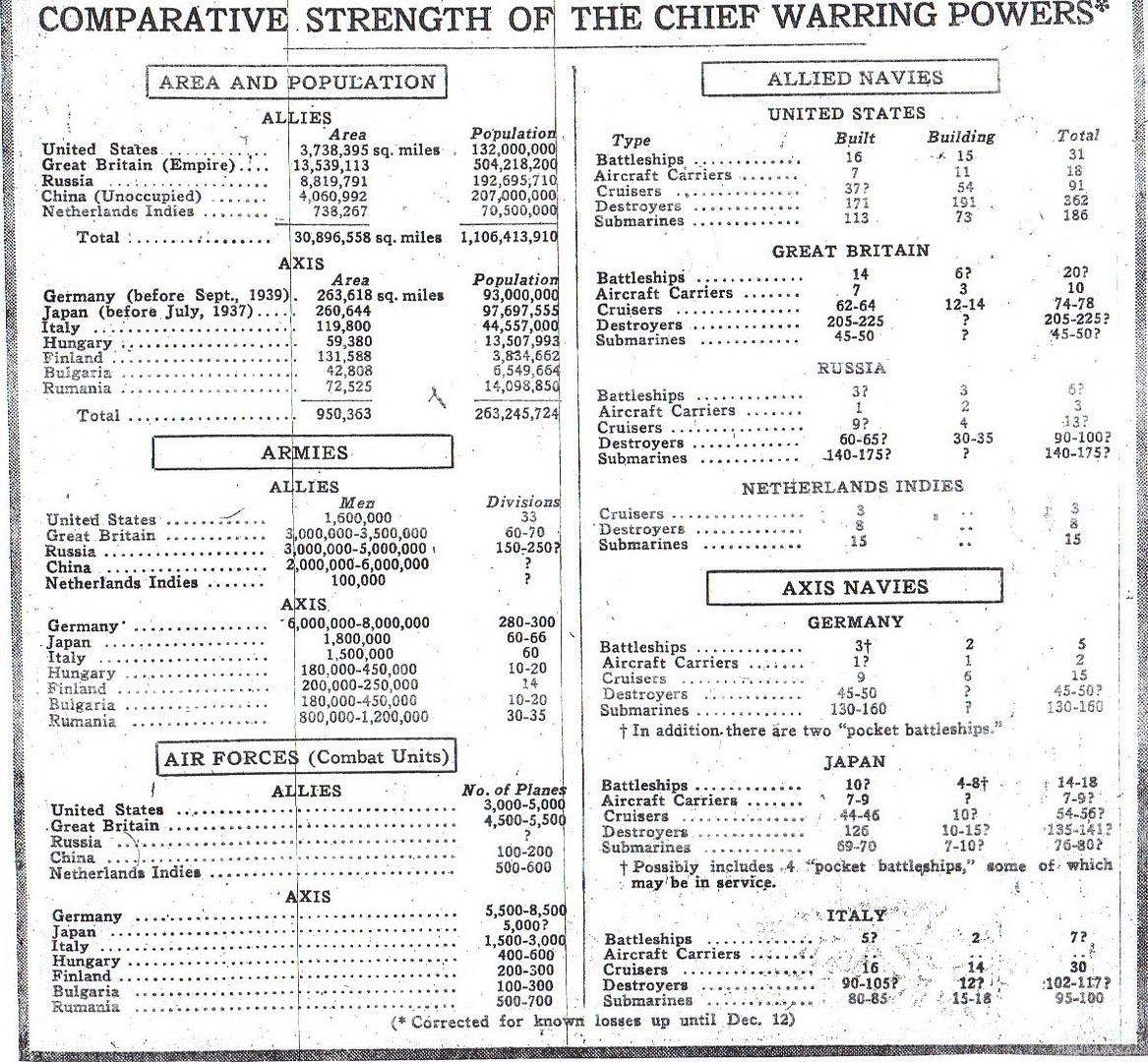
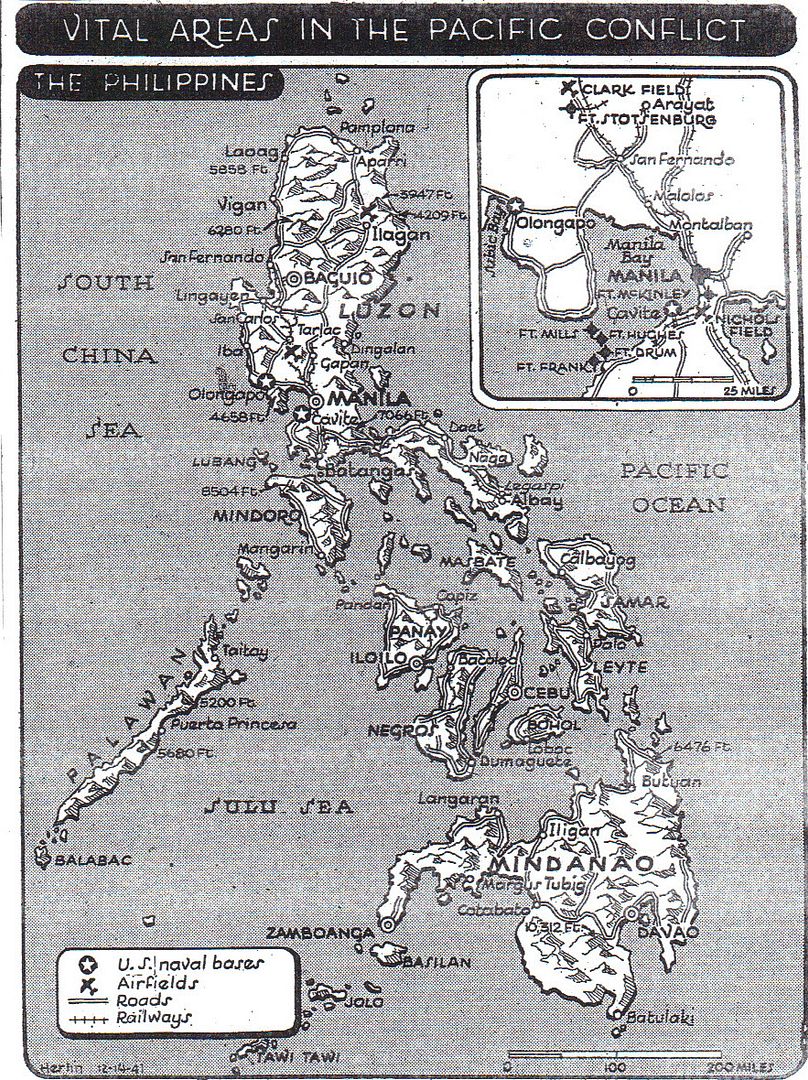

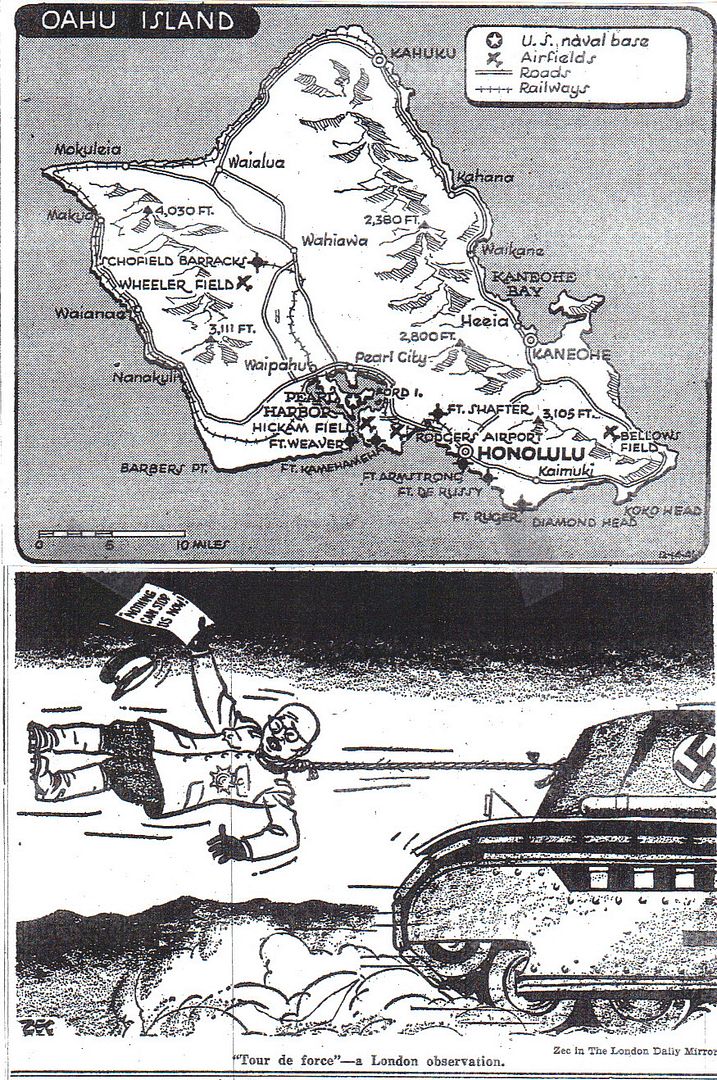
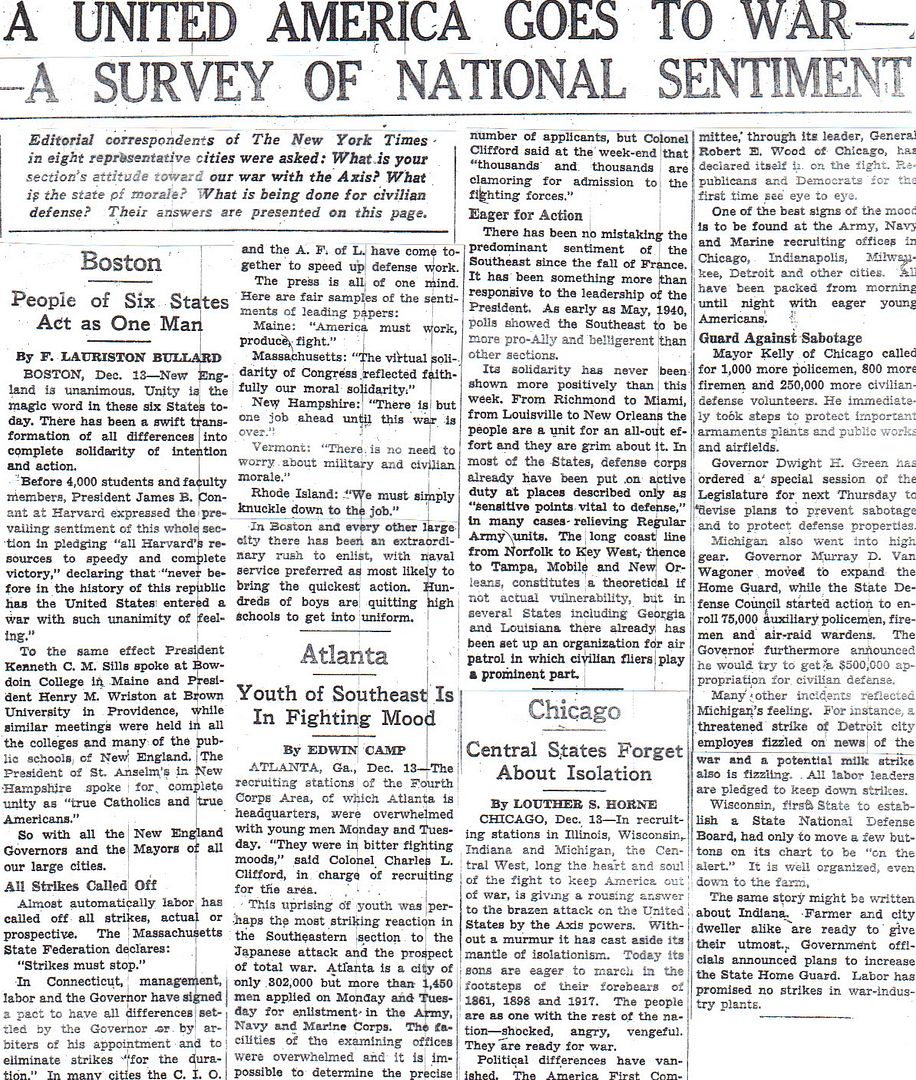
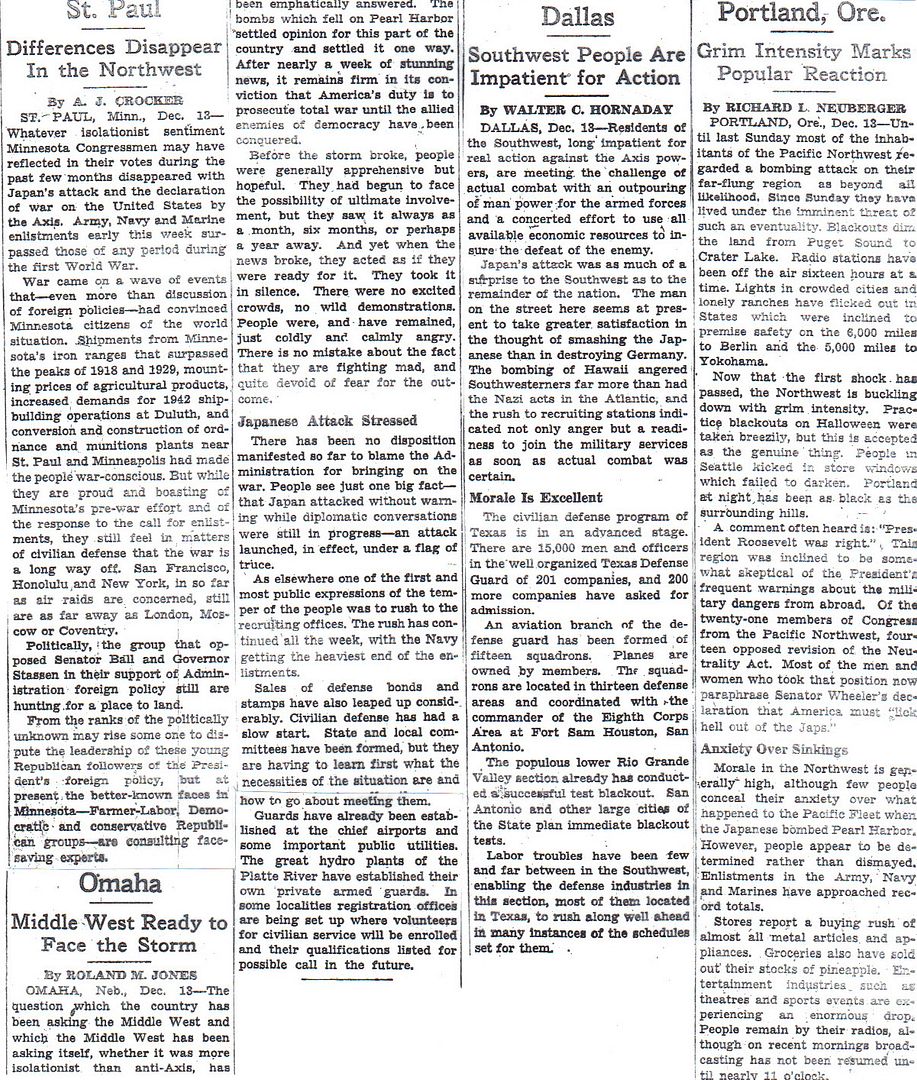
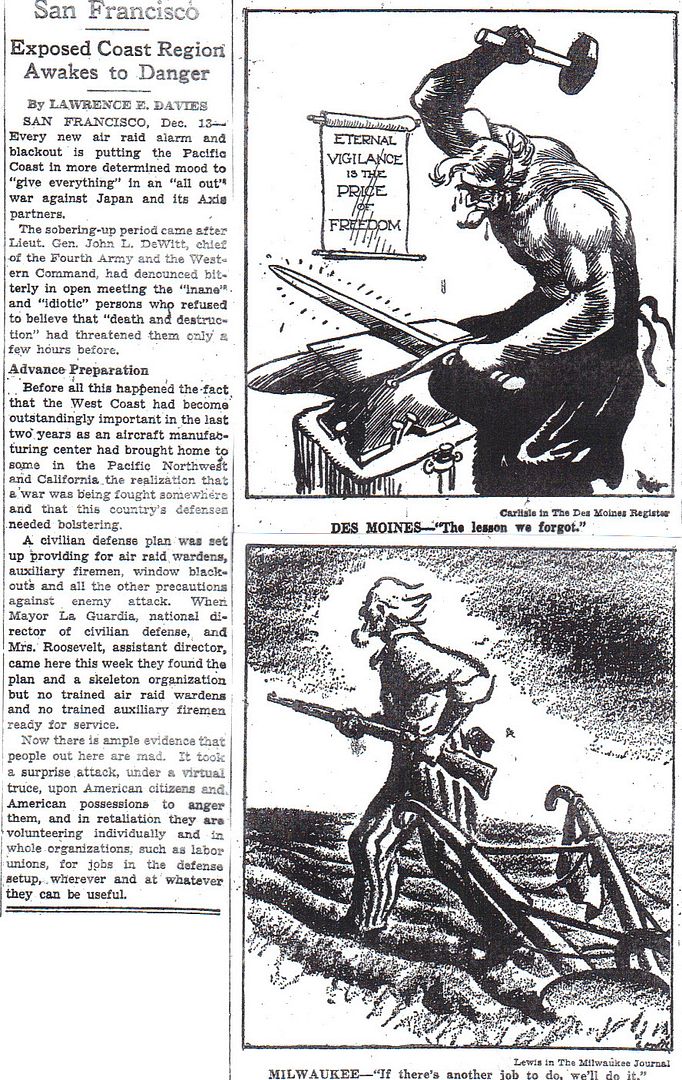
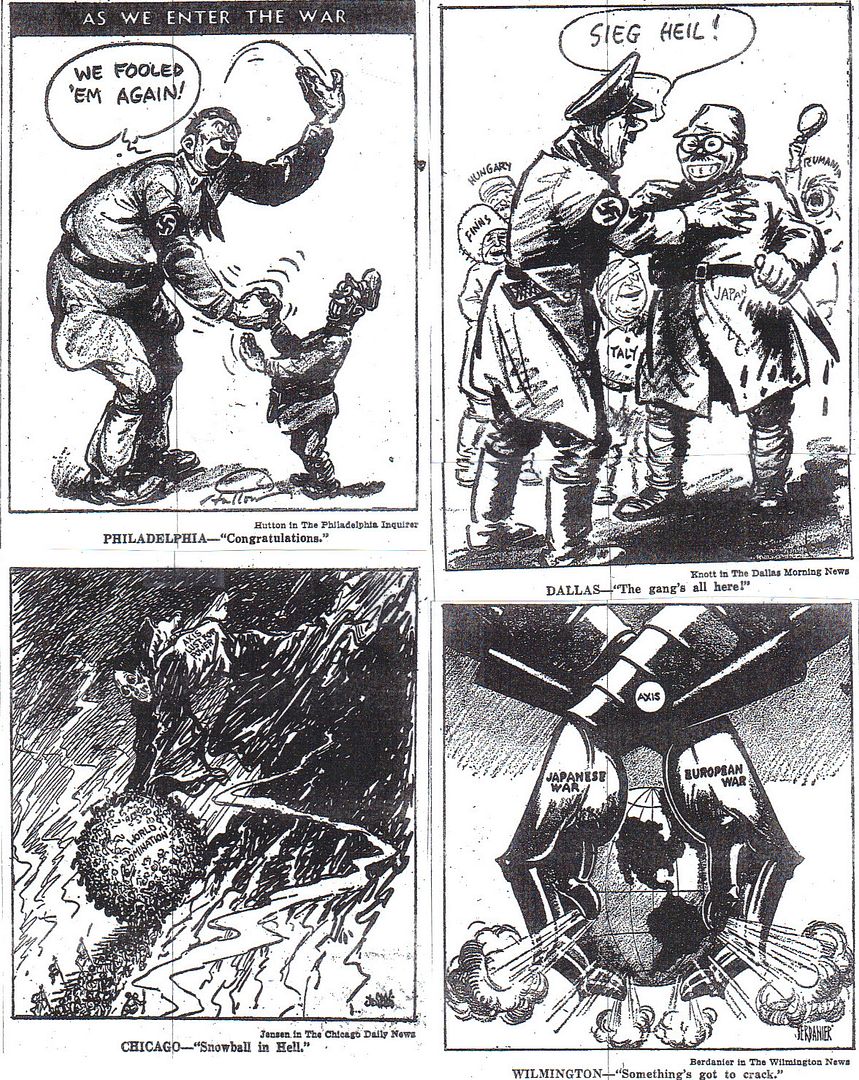
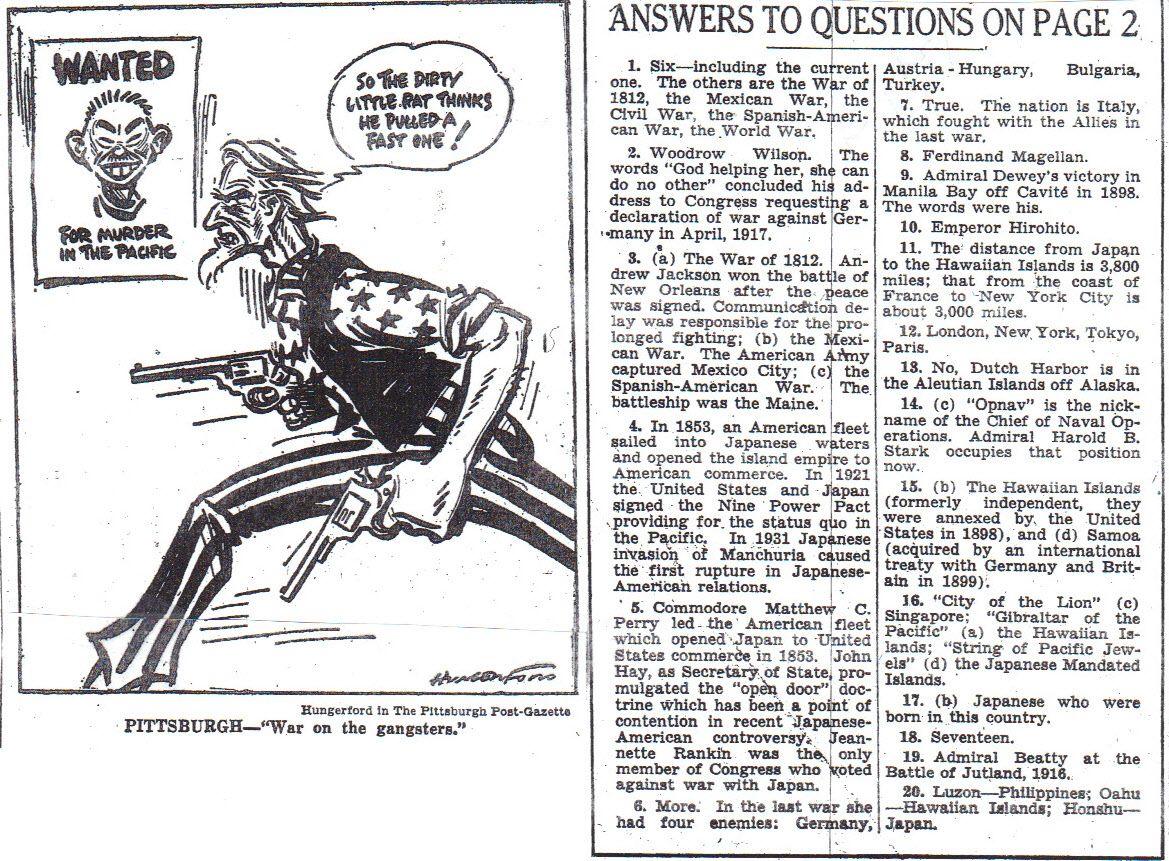
More falsehood from the Philipine.
Here’s what really happened to the ‘invasion’:
“There was no activity near Vigan during the night of the 10th, but from Lingayen Gulf, 100 miles to the south, came reports of another Japanese landing. Around midnight “several dark shapes” were observed approaching the mouth of the Agno River. When confirmation was received, one battery of the 3d Battalion, 21st Field Artillery (PA), opened fire. “It was like dropping a match in a warehouse of Fourth of July fireworks,” wrote the American instructor assigned to the regiment. “Instantly Lingayen Gulf was ablaze. As far as the eye could see the flashes of artillery, shell-bursts, tracer machine gun bullets and small arms. . . . Thousands of shadows were killed that night.”34 When morning came, all that was found of the supposed invasion was one life preserver with markings which may have been Japanese characters. The absence of sunken ships did not prevent the 21st Division commander, Brig. Gen. Mateo Capinpin, from reporting to Manila that an attempted hostile landing had been repulsed.35
“What actually happened that night was that the Japanese had sent one motor boat into Lingayen Gulf on a reconnaissance mission. The Japanese had no force near Lingayen then and no plan for a landing in the area at that time. Nevertheless, the news of the frustrated enemy landing was reported in the press as a great victory and the 21st Field Artillery was officially credited with repulsing an enemy landing.”36
http://www.history.army.mil/books/wwii/5-2/5-2_6.htm#p100a
Some good books there. I’ll probably get an ereader for Christmas - I’ll have to figure out how to get them on it.
I'll have to look it up but I seem to recall MacArthur having received a much larger compensation package from the Philippines.
Also, it is important to note that MacArthur was in command of the forces on the Philippines since the end of 1935 (though I think he didn’t actually arrive in the Philippines until the beginning of 1936). MacArthur was specifically sent to the Philippines to develop the Filipino Army. This “citizen army” that MacArthur had been trying to develop represented a large contingent of the combatants against the Japanese. Even the U.S. forces he inherited only four months before the beginning of hostilities were composed of over 50% Filipino Scouts. MacArthur had a pretty heavy hand in the composition of the defenses on the Philippines for the last 5 years, so it’s hard to give him a pass just because the 11,000 some odd Americans added to his forces were a last minute addition.
During the 1930's, American men in the U.S. army trained by pointing wooden rifles and saying "bang, bang". Simultaneously, the Philippines were an American territory and dependent upon American largesse. Because production of American defense related items was near zero during the 1930's, I'm not sure what MacArthur could have done differently. American training and equipment was not even second rate and the Filipinos had to make do with American cast-offs.
Many like to skewer MacArthur but they should pause and consider that the Japanese were not happy either. Corregidor held out until May 1945 and denied Japan use of Manila Harbor for that period thereby upsetting Japans entire timetable for conquest in New Guinea, Australia and the Pacific. The Japanese were so unhappy they recalled general Homma to Japan and forced him into retirement.
Back when Hollywood and the media were not anti-American.
If you could do that, I'd be interested in seeing it. Also, when he received it and where the information comes from would be important.
Again, I can't give him a pass because training in the states was lacking. He was brought in to get the Filipino Army in a condition where it could defend itself and he failed to do so. I agree with the decision to relieve General Short for his shortsightedness at Pearl Harbor, and would have supported the relief of MacArthur for the same lack of vision.
Additionally, he exacerbated the situation with his decision to defend at the beaches with forces that he should have known were not in a condition to do so and added to that his decision to uphold the Filipino laws that restricted the transport of food stocks across district borders even though they were in the process of being invaded.
The men in the field did an excellent job and held the Japanese off until May of 1942, but they could have held out longer had MacArthur stuck with WPO-3 which was the current Plan Orange for the Philippines in the War Department. The War Department estimated that they would be able to hold out on the Bataan Peninsula for 12 months (which granted still may have not been long enough) instead of five.
Such incidents happened wherever tensions were high. Think about the Los Angeles air raid.
Most definitely. Just give me a couple of days since it's been so long, I don't remember exactly where I read it and may have to bit of digging to find it. Regardless of what I eventually locate, I will post back to you.
Again, I can't give him a pass because training in the states was lacking. He was brought in to get the Filipino Army in a condition where it could defend itself and he failed to do so.
My understanding is that MacArthur, a man who knew the Philippines and Filipino's very well never expected to get a Philippine force into a condition where it could defend itself. He anticipated a force capable of fighting a delaying action until support could be received from America.
I agree with the decision to relieve General Short for his shortsightedness at Pearl Harbor, and would have supported the relief of MacArthur for the same lack of vision.
When in possession of all information and having the perfect clarity of hindsight, it is easy to second guess decisions. However, based on what was available to MacArthur in 1941, what did he do that was so wrong as to warrant his being sacked?
Additionally, he exacerbated the situation with his decision to defend at the beaches with forces that he should have known were not in a condition to do so
Again, I think you say these things armed with all information and the clarity of hindsight. Had MacArthur instead, consolidated all his forces in Bataan, I dare say authors would be skewering him for having not met the enemy on the beaches.
and added to that his decision to uphold the Filipino laws that restricted the transport of food stocks across district borders even though they were in the process of being invaded.
I don't know about Filipino laws or their significance but MacArthur certainly did send supplies into Bataan and Corregidor upon activation of Orange.
The men in the field did an excellent job and held the Japanese off until May of 1942, but they could have held out longer had MacArthur stuck with WPO-3 which was the current Plan Orange for the Philippines in the War Department. The War Department estimated that they would be able to hold out on the Bataan Peninsula for 12 months (which granted still may have not been long enough) instead of five.
Because we are both reasonable people seeking better understandings of events, I have to ask you to provide an original source for your information about a 12 month holdout period. I'd really be interested in learning about it because from a logistical standpoint, it's really a cookbook formula. X tons of supplies are needed to supply X men for X period of time. My understanding has always been that MacArthur's entire strategy rested upon assurances by Washington of resupply and reinforcement from America... something which never happened. Not even the supply convoy enroute to the Philippines on Dec 8, 1941 was permitted to resupply the islands.
Absolutely. He knew the level in which his men were trained and as you said, he didn't expect the Philippine force to be able to defend itself. He should have known better than to spread them out thin and make them try to defend the beaches. This was a blatant waist of manpower and warrants dismissal.
If authors of today were blasting him for consolidating his position on Bataan, I would not be in agreement with them. With the condition of his forces it is only logical to minimize the front that they need to defend.
The supplies he sent to Bataan and Corregidor was just a drop in the bucket compared to what he could have sent and even less than what should have remained there in the first place. He did enforce Filipino law restricting movements of stores which increased the amount of lost stores. Then there were the additional losses due to his poor decision in initial deployment which left many rail workers, and truck companies fleeing for their lives. Trains were left on the tracks and truck fled to Bataan empty.
I'll get you the 12 month projection later tonight. I think I remember where that is, but I'll have to double check.
On the quiz, I missed three questions, so I get a “B.”
I believe Time magazine was using the term “World War II” in September, 1939. Interestingly, the British seem to prefer the term “Second World War,” while in the US, WWII is preferred.
Ok. I found the reference I was talking about. It’s alot harder without my laptop which has my notes in it. First I should clarify that the War Plans Department estimate of 12 months was the maximum. That is a little unclear in my previous post.
This is discussed in a WPD memo that can be found in the National Archives, Record Group 165, WPD-4192 in a memo from George V. Strong to George C. Marshall
Both WPO-2 and WPO-3 both state that a minimum defense of six months be maintained so that establishes the range that was required, 6 to 12 months.
This is discussed in a WPD memo that can be found in the National Archives, Record Group 165, WPD-4192 in a memo from George V. Strong to George C. Marshall
Both WPO-2 and WPO-3 both state that a minimum defense of six months be maintained so that establishes the range that was required, 6 to 12 months.
Thanks. I've never really heard of such a long holdout period but I also don't profess to be an authority. In any event, it 4, 6 or 12 months wouldn't have mattered. FDR and the War Department were not going to resupply the Philippines garrison and the men were doomed.
We're at my parents right now for the holidays and I hoped to get to the library at OSU (Ohio State) tonight to research from where it was I got the notion about MacArthurs compensation by the Philippines government but didn't make it. Hopefully I can get there tomorrow. The library is pretty extensive so, if you have anything you'd like for me to look up while I'm there, say so.
Very true. Even if they wanted to, it would have required the longer end of the time line if we assume that the first landings at Guadalcanal represent the earliest possible attempt to reinforce the Philippines had it held out. But of course that is just an assumption.
I can’t think of anything specific I need at the moment except for some stuff in College Park, Maryland at the National Archive II, but I am writing a major paper on American and Japanese cryptology in the 1930s and early 40s this spring. If you are poking around and run across anything interesting let me know.
There is a very interesting article written by R.J Hanyok which appeared in the Dec 2006, issue of World War II magazine titled "Blinded by the Rising Sun: Japanese Radio Deception Before Pearl Harbor"
Thanks. I have read that one. Hanyok has written several articles that I have found useful in the past. He also wrote “Eavesdropping on Hell: Historical Guide to Western Communications Intelligence and Holocaust, 1939–1945” which is an analysis of Allied code breaking in reference to German messages concerning the Holocaust. I haven’t read this yet, but I understand it is pretty interesting.
IF you haven't already done so, the fact that senders of manual morse code can be uniquely recognized by their "fist" adds an element to signals intelligence that may be worth addressing in your research.
Yes, it's long been known that a morse sender has a style every bit as unique as handwriting or a paper signature. However, CW which is short for continuous wave and popularly known as morse code is becoming such an increasingly obscure technology that many modern readers are unlikely to be aware of the uniquely identifiable characteristics of a senders "fist" and what that implies from a SIGINT standpoint.
He also wrote “Eavesdropping on Hell: Historical Guide to Western Communications Intelligence and Holocaust, 1939–1945” which is an analysis of Allied code breaking in reference to German messages concerning the Holocaust. I haven’t read this yet, but I understand it is pretty interesting.
Thanks. I'll keep an eye open for it.
As for our discussion about MacArthur and the Philippines, I have had problems with the OSU library due to both of us being on holiday schedule. I did make it there briefly Saturday just before closing and again yesterday but for less than 2 hours prior to closing.
I did manage to obtain and read Gen Wainwrights 1946 book "General Wainwright's Story: The account of four years of humiliating defeat, surrender, and captivity". If there was anyone that might hold a grudge against MacArthur, it would be Wainwright but he is basically supportive of all MacArthur's decisions.
Even when looking for ways to "read between the lines", I didn't find cause in Wainwrights book to justify the sort of criticism directed at MacArthur by those who were not present. Never-the-less, there are memoirs of other first hand participants I have yet to read but hope to do so in the coming days.
It's already too late to head down to the OSU library today but hopefully I can get there early tomorrow and research the memoirs of other first hand participants. We will continue this discussion.
That is correct and they gave a good account for themselves. BTW, the Philippine bomber force consisted of three B-10's.
I havent decided how in depth I will get on the radio deception aspects of cryptology but I definitely will think about including a segment on sender “fists” and their significance to Japanese deception. I’m limited to around 50 pages so I need to be careful how I put things together, not to mention that I still have to figure out how to fit my research in with my work and family schedule (which is why I’m already starting on it now even though the class doesn’t even start until mid January).
As to Wainwright, one thing is for certain, he was a good soldier. It was not his place to criticize his commanding officer and I don’t think it was in his nature to do so even down the road when he was no longer under him. Who knows, if he had been in MacArthur’s shoes he might have made the same bad decisions MacArthur did. That’s hard to speculate on since Wainwright was dealt a real bad hand having to suddenly take over a collapsing defense as MacArthur scurried off to Australia (by FDR’s orders). We only got a very brief look at this command and decision making ability and it was under the worst possible circumstances.
I imagine you should be able to make your essential point about an operators fist being readily recognizable and what that entails from a SIGINT standpoint in less than a double spaced 12point page.
Basically, regardless of whether a transmission is coded or not, an experienced listener can recognize different morse operators and the conditions upon which they made a transmission; normal or abnormal. Abnormal could of course mean the operator was tired, ill, or under stress/duress.
Radio direction finding techniques can determine the location of a transmitter. That an operators "fist" can be recognized means location of the operator can also be determined. If the operator has moved, he may have been transferred, or his unit moved with him.
Machine transmissions tended to be at higher rates and I'm not sure to what extent a listener could tell differences between machines but I will ask a friend who has a good bit of knowledge in this area and get back to you on it.
As to Wainwright, one thing is for certain, he was a good soldier. It was not his place to criticize his commanding officer and I don’t think it was in his nature to do so even down the road when he was no longer under him.
Who knows, if he had been in MacArthur’s shoes he might have made the same bad decisions MacArthur did.
In addition to the other items I have promised a response to, I will respond to that comment directly. The only reason I don't respond right now is because I'm waiting to hear something from Freeper GreenLightlantern who seems to be a real MacArthur hater. If after some reasonable period of time GreenLight hasn't replied, I will post to both of you.
Disclaimer: Opinions posted on Free Republic are those of the individual posters and do not necessarily represent the opinion of Free Republic or its management. All materials posted herein are protected by copyright law and the exemption for fair use of copyrighted works.